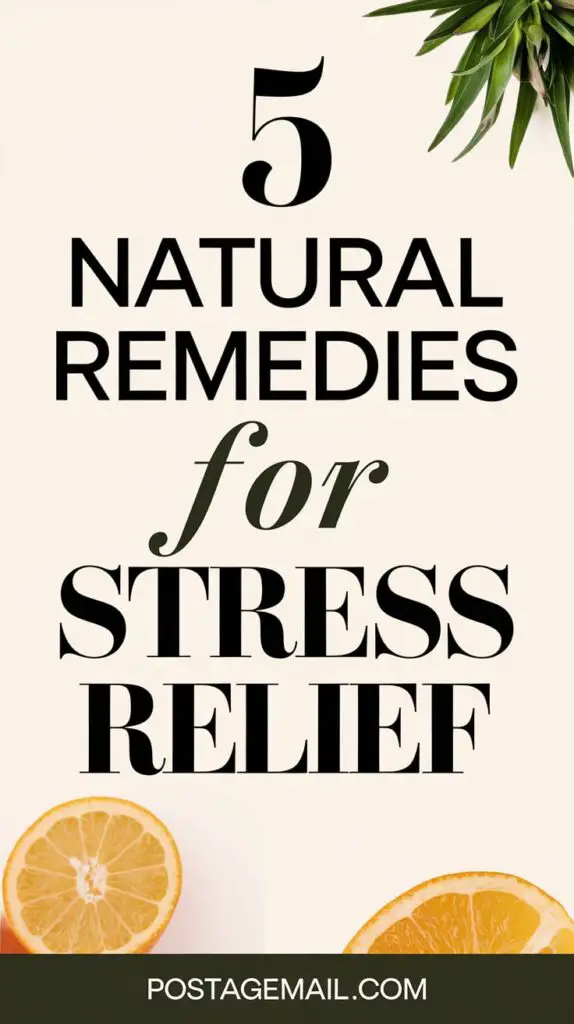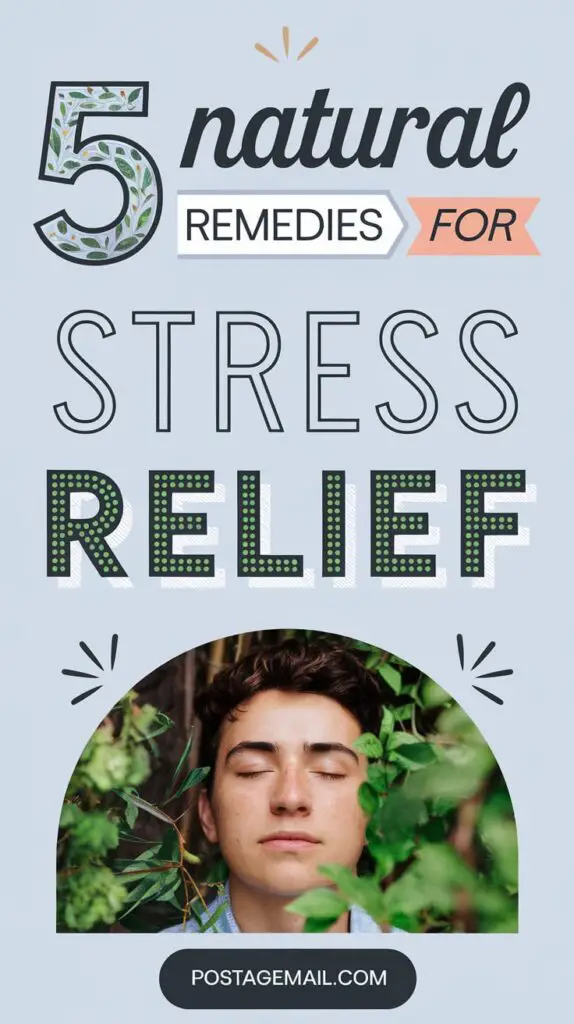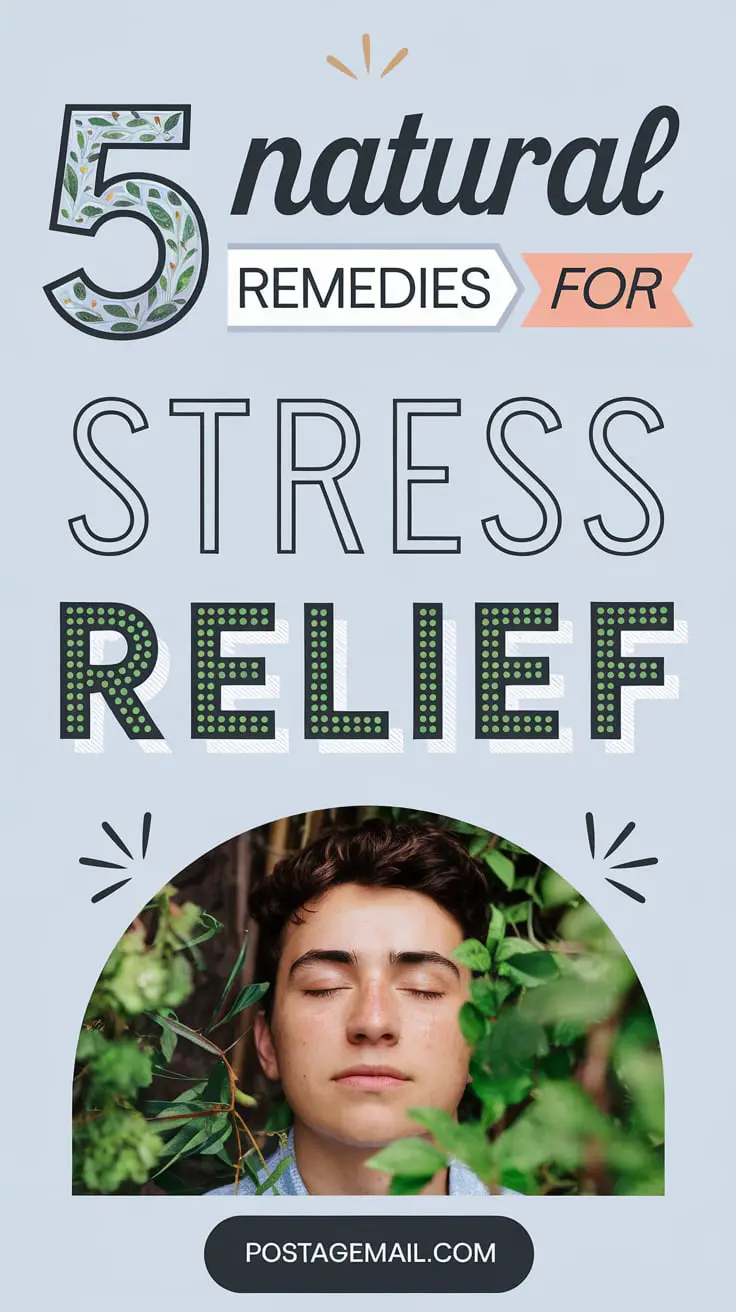Stress is something everyone experiences, but when it becomes chronic, it can significantly impact our mental and physical health. Whether it’s the pressure of work, family commitments, or the everyday challenges life throws our way, stress is inevitable. However, finding natural ways to manage it can help reduce its harmful effects and promote long-term well-being.
In this article, we will explore five natural remedies for stress relief that can easily be incorporated into your daily routine. From soothing aromatherapy to getting active, these remedies can offer both immediate relaxation and long-term relief. We’ll also share expert tips and FAQs to help you get the most out of these practices.

Introduction to Stress and Its Impact on Health
Before diving into the remedies, it’s important to understand how stress affects our body and mind. Stress is the body’s natural response to a challenge or demand, and while it can be beneficial in small doses (like motivating you to meet deadlines), chronic stress can have serious consequences.
Short-Term and Long-Term Stress Effects
- Short-Term Effects: When stressed, the body releases hormones like adrenaline and cortisol. This is often referred to as the “fight or flight” response, which prepares you to take quick action. While this is helpful in dangerous situations, frequent activation can lead to feelings of anxiety, restlessness, and difficulty concentrating.
- Long-Term Effects: Chronic stress has been linked to numerous health problems, including heart disease, digestive issues, weakened immune system, and even mental health disorders like depression and anxiety. The constant state of “high alert” also wears down the body, making it harder to recover and relax.
Stress is normal, but managing it is essential for maintaining a healthy life. Thankfully, there are several natural remedies to help you manage stress and regain balance.
Remedy #1: Aromatherapy
Aromatherapy uses essential oils to improve physical and emotional well-being. The powerful scents of essential oils can have a calming effect on the mind and body, helping to reduce stress and anxiety. Aromatherapy is a popular method for stress relief, and it’s easy to incorporate into your routine.
How It Works
Aromatherapy triggers your olfactory senses (sense of smell), which then sends signals to your brain’s limbic system. This part of the brain controls emotions, behavior, and memory, making it a key player in how we respond to stress.
Essential Oils for Stress Relief
- Lavender: Known for its calming properties, lavender is one of the most commonly used essential oils for stress relief. It can help reduce anxiety, promote relaxation, and improve sleep quality.
- Chamomile: Chamomile essential oil is known for its soothing effects, making it ideal for stress relief and relaxation.
- Bergamot: This citrus oil is uplifting and can help reduce feelings of anxiety and stress.
- Frankincense: Often used in meditation practices, frankincense is believed to help calm the mind and promote deep relaxation.
How to Use Aromatherapy
- Diffuser: Use an essential oil diffuser to spread calming scents throughout your home.
- Topical Application: Add a few drops of essential oil to a carrier oil (like coconut or jojoba oil) and massage it onto your skin, especially on pressure points like your wrists, neck, and temples.
- Bath Soak: Add a few drops of essential oil to your bathwater for a relaxing soak.
Extra Tip: Create a Relaxation Ritual
Make aromatherapy a part of your wind-down routine. Lighting a lavender-scented candle or using an essential oil diffuser before bed can help signal to your body that it’s time to relax.

Remedy #2: Herbal Teas
One of the simplest and most effective ways to relieve stress is by sipping a cup of herbal tea. Many herbs have been traditionally used to reduce anxiety and promote calmness. Drinking warm tea can also have a comforting effect on your body, helping to signal relaxation.
Top Herbal Teas for Stress Relief
- Chamomile Tea: Chamomile is widely known for its calming effects. It contains an antioxidant called apigenin, which binds to specific receptors in the brain, promoting relaxation and sleep.
- Peppermint Tea: Peppermint is not only refreshing but also soothing to the digestive system. Since stress can often cause digestive issues, peppermint tea can help calm both your mind and stomach.
- Lemon Balm Tea: A member of the mint family, lemon balm tea has mild sedative properties that may help relieve anxiety and improve sleep quality.
- Valerian Root Tea: Valerian root has been used for centuries as a natural remedy for insomnia and anxiety. It can help ease nervous tension and promote deeper, more restful sleep.
How to Make Herbal Tea for Stress Relief
- Steep one tea bag (or 1-2 teaspoons of loose leaf tea) in hot water for 5-10 minutes.
- Drink before bed for improved sleep or during the day for stress relief.
Pro Tip: Customize Your Tea
Try blending different herbs to create a personalized calming tea. For example, chamomile and lavender make a perfect duo for unwinding after a stressful day.
Remedy #3: Breathing Exercises
Breathing exercises are one of the most effective ways to reduce stress in the moment. Deep breathing helps activate the parasympathetic nervous system, which is responsible for the body’s relaxation response.
The Science Behind Breathing
When stressed, you tend to breathe shallowly, which activates the fight-or-flight response. By consciously practicing deep breathing, you counteract this response, signaling to your body that it’s time to relax.
Breathing Exercises for Stress Relief
- Box Breathing: Inhale for 4 counts, hold for 4 counts, exhale for 4 counts, and hold for 4 counts. Repeat this for a few minutes.
- 4-7-8 Breathing: Inhale for 4 counts, hold for 7 counts, and exhale for 8 counts. This technique helps calm the nervous system.
- Diaphragmatic Breathing: Place one hand on your chest and the other on your stomach. Inhale deeply through your nose, allowing your diaphragm (not chest) to rise. Exhale slowly through your mouth. Repeat for a few minutes.
Pro Tip: Incorporate Breathing into Your Day
Whenever you feel stressed, take a few minutes to practice deep breathing. Doing so during a break at work or before a big presentation can help you stay calm and focused.
Remedy #4: Meditation Practices
Meditation is a centuries-old practice that helps calm the mind and body, making it a powerful tool for managing stress. Whether you practice mindfulness, guided, or transcendental meditation, the goal is to focus your mind and let go of the mental clutter that causes stress.
How Meditation Relieves Stress
Meditation encourages you to focus on the present moment and become aware of your thoughts without judgment. By regularly meditating, you train your mind to handle stress more effectively and develop greater emotional resilience.
Simple Meditation Practices
- Mindfulness Meditation: Focus on your breath, paying attention to the sensation of the air entering and leaving your body. If your mind starts to wander, gently bring your focus back to your breath.
- Guided Meditation: Use apps or online videos to follow a guided meditation. These often involve visualization exercises or calming instructions that lead you to a relaxed state.
- Body Scan Meditation: Starting from your toes, mentally scan your body, paying attention to any areas of tension. Slowly relax each part of your body as you go up to your head.
Pro Tip: Start Small
If you’re new to meditation, start with just 5-10 minutes a day. Over time, gradually increase the duration as you become more comfortable with the practice.
Remedy #5: Physical Activity
Exercise is one of the most effective natural remedies for stress relief. Physical activity helps release endorphins, which are your body’s natural mood elevators. Exercise also promotes better sleep, improves self-esteem, and reduces the physical symptoms of stress.
Types of Exercise for Stress Relief
- Walking or Jogging: A simple walk or jog in nature can help clear your mind and reduce stress.
- Yoga: The combination of physical movement, breathing, and meditation makes yoga a great stress-relieving practice.
- Strength Training: Lifting weights or doing bodyweight exercises helps release endorphins and relieve stress.
- Dancing: Whether it’s a dance class or just dancing in your living room, dancing is a fun way to reduce stress.
Extra Tip: Incorporate Movement into Your Routine
Even if you can’t commit to a full workout, try to include small bursts of activity throughout the day, such as stretching or taking the stairs.
Conclusion: Integrating Stress Relief Remedies into Daily Life
Incorporating these natural stress relief remedies into your daily routine doesn’t have to be difficult. You don’t need to overhaul your life; start with small changes and build from there. Whether it’s a cup of calming herbal tea or a few minutes of deep breathing, taking time for self-care can have a profound effect on your stress levels.
Frequently Asked Questions (FAQs)
1. How long will it take to feel the effects of these remedies? The effects can vary depending on the remedy. Some, like breathing exercises or aromatherapy, can have immediate effects, while others, like meditation or physical activity, may require consistent practice over time.
2. Can I combine these remedies? Yes! In fact, combining multiple remedies can amplify their stress-relieving effects. For example, you could practice deep breathing during a meditation session or enjoy a calming cup of tea before yoga.
3. How often should I practice these stress-relieving methods? For best results, try to practice these remedies daily. Even small doses of these activities can add up to significant stress relief.
4. Are these remedies suitable for everyone? While these remedies are generally safe for most people, always listen to your body. If you have a medical condition or are pregnant, it’s a good idea to check with a healthcare professional before trying new remedies, especially herbal teas or essential oils.
5. What if these remedies don’t help with my stress? If you find that these natural remedies aren’t effective enough or if your stress is affecting your daily life, it’s important to seek professional help. A therapist or healthcare provider can offer more personalized treatment options.

